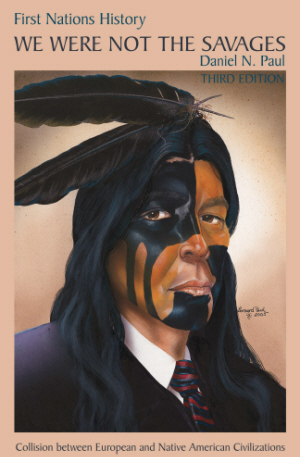 |
|
HOME |
|
CONTACT |
|
WEBSITE MAP |
|
MAP
Land Of The Mi'kmaq |
|
FIRST NATIONS HISTORY"We Were Not
The Savages" |
|
Click to Access Over 230 Pages of FIRST NATIONS History Highlights Paintings, Photos |
|
Newspaper Columns Written By
Daniel N. Paul
1994 - 2005 |
|
Links
First Nation Education, Business, History, etc., Websites |
|
Links
Non-First Nation Websites |
|
Journalist
And
Reviewer |
|
Consultant
Indian Act And Related Issues
|
|
Justice Of The Peace |
|
Daniel N. Paul Resume |
|
History Bits And Native American News Events |
|
Mi'kmaq First Nation Photos
************************ |
|
Benjamin Franklin
1706 - 1790
Franklin wrote the following after a large group of innocent Indians were massacred because of the actions of others from another Tribe:
"If an Indian injures me, does it follow that I may revenge that Injury on all Indians? "It is well known that Indians are of different Tribes, Nations and Languages, as well as the White People. "In Europe, if the French, who are White People, should injure the Dutch, are they to revenge it on the English, because they too are White People? "The only Crime of these poor Wretches seems to have been, that they had a reddish brown Skin, and black Hair; and some People of that Sort, it seems, had murdered some of our Relations. "If it be right to kill Men for such a Reason, then, should any Man, with a freckled Face and red Hair, kill a Wife or Child of mine, it would be right for me to revenge it, by killing all the freckled red-haired Men, Women and Children, I could afterwards any where meet with." |
|
|
 |
 |
 |
Chapter 1 | Chapter 2 | Chapter 3 | Chapter 4 | Chapter 5 | Chapter 6 | Chapter 7
Chapter 8 | Chapter 9 | Chapter 10 | Chapter 11 | Chapter 12 | Chapter 13 |Chapter 14
|
 
|
|
Chapter 13
We Were Not the Savages - Twentieth Century Racism and Centralization
The twentieth century belongs to Canada,” predicted Sir Wilfrid Laurier,
Prime Minister of Canada from 1896 to 1911. In many respects his
prediction came true. The country became prosperous and developed one
of the highest standards of living in the world. However, the vast majority of
its citizens of colour did not benefit much from this achievement. They were
blatantly victimized by racism, marginalized and denied economic opportunities.
Even in the twenty-first century their exclusion from full participation in
economic and social affairs persists to an unacceptable degree in many Canadian
jurisdictions.
Twentieth-Century Racism
In the article, “Lessons at the Halfway Point,” Michael Levine accurately
identifies why intolerance exists: “If you don’t personally get to know people
from other racial, religious or cultural groups, its very easy to believe ugly
things about them and make them frightening in your mind.”1 If Europeans
had gotten to know and had accepted Americans and Africans as equals during
colonial times, instead of adopting White supremacist racist beliefs, which
have ruled supreme in negatively depicting both as savages for the better part
of five centuries, these peoples of colour would not have suffered the indescribable
hells they have.
In fairness, it must be said that the hells suffered in North America by both
groups were not equally severe across the continent. The severity varied from
state to state, province to province, and community to community. Because of
the way it badly mistreated both the Mi’kmaq and African Nova Scotians, Nova
Scotia has been deemed by many as among the most racially discriminatory
jurisdictions on the continent. In fact, until recent times, some referred to it as
“the Mississippi of Canada.”
The designation was well deserved. Members of both communities were
regularly denied employment, and entrance to most hotels, restaurants and
other public places, with impunity (Jews and other minorities also suffered
many of these indignities, but not as severely). Even in death intolerance often
ruled. Some cemeteries had coloured sections reserved especially for Blacks,
indigents and the insane. The Mi’kmaq weren’t subjected to this particular
indignity because most of our cemeteries are located on-Reserve.
Many other gross indignities were suffered over these years by both peoples.
Among the worst of these was that when a crime was committed near one of our
|
 
|
|
PURCHASE INFORMATION
can be found on the right hand side of the HOME Page
**************************
|
|





